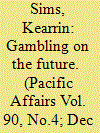|
|
|
Sort Order |
|
|
|
Items / Page
|
|
|
|
|
|
|
| Srl | Item |
| 1 |
ID:
156691


|
|
|
|
|
| Summary/Abstract |
Following the extraordinary wealth generation of casinos in Macau and Singapore, governments and non-state actors across Southeast Asia have developed gambling establishments as a means of fast-tracking economic growth and stimulating national development. Yet, here and elsewhere, casinos have been heavily criticized for their association with immoral behaviour, problem gambling, corruption, and organized crime. In this article, I focus on two casinos in northern Laos to address two research questions. First, I consider how casinos have come to exist within the remote border regions of one of Asia’s least developed countries. I discuss vice economies within the Golden Triangle region, multi-actor aspirations to boost transnational connectivity within continental Southeast Asia, strengthening political-economic relationships between Laos and China, and Government of Laos efforts to use foreign investment as a mechanism for increasing governance capacities in borderlands. Following this, I critically analyze the relationship between casinos and development in Laos. I focus specifically on the multifarious effects of casinos on the lives and livelihoods of local communities to argue that casino development has been informed by logics of expulsion and the establishment of new predatory formations. To make this argument, the article draws on four fieldwork visits to each of the casino sites between 2011 and 2015, desk-based research, and interviews with local residents, casino staff, and members of the Government of Laos.
|
|
|
|
|
|
|
|
|
|
|
|
|
|
|
|
| 2 |
ID:
133460


|
|
|
|
|
| Publication |
2014.
|
| Summary/Abstract |
A typical Chinese tourism website advertising a week in New York City including three days of sightseeing, one day of shopping on Fifth Avenue, and one day looking at real estate investment opportunities-condos preferred, and ideally of the luxury variety. Chinese tourists, admittedly not the poorest segment of this society, now outnumber and outspend American tourists. And when they return home, they regularly comment about the overseas "bargains" they found. Even for ordinary Chinese who've never ventured abroad, the prices of overseas products continue to fall. Many have come to accept a constantly strengthening currency as the natural order.
|
|
|
|
|
|
|
|
|
|
|
|
|
|
|
|
| 3 |
ID:
192984


|
|
|
|
|
| Summary/Abstract |
In this article, we explore how tourism in Xinjiang is politically weaponised. Commodifying Uyghur cultural heritage for tourism allows the Chinese Communist Party (CCP) to insist it is not committing cultural genocide, but actually “conserving” Uyghur culture. This directly bears on the CCP’s internment of Muslim minorities in “re-education” camps, ostensibly to target Islamic “extremism.” We explore how tourism to Xinjiang is presented as a “success” of the camps and conscripted into the “Sinicisation” of the region and the secularising of minorities’ cultures. Places and practices are deconstructed as cultural heritage, and reconstructed to provide tourists with “exotic” experiences of “wonderful Xinjiang.” This transforms the “tourist gaze” into a “testimonial” one: tourists to Xinjiang are made into witnesses that “Xinjiang is beautiful” and Uyghurs are “happy.” In this, touristic development and tourists themselves are key agents in the CCP’s territorialisation of Xinjiang, the sinicisation of Uyghur culture, and the legitimation of the violence of the camps.
|
|
|
|
|
|
|
|
|
|
|
|
|
|
|
|
|
|
|
|
|